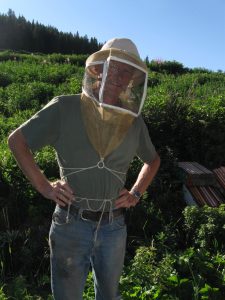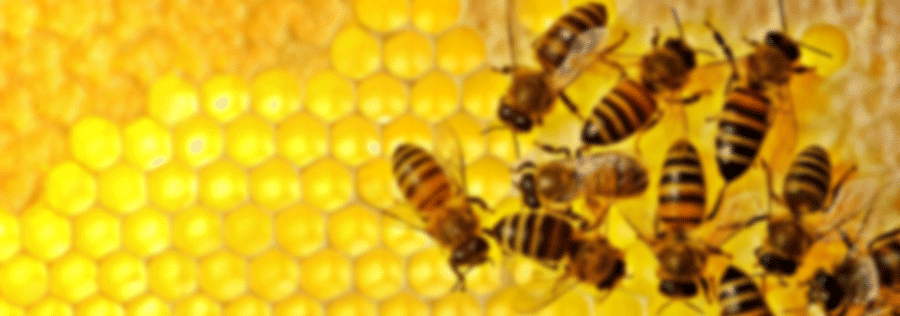
Get On Board!
coloradobees1@gmail.com
By Ed Colby
Galveston
Paul and I depart in the teeth of a snowstorm. Over Vail Pass, up the long hill to the Eisenhower Tunnel, no problem, then down to Denver the Mile High City, now South, bound for Texas, where the cotton blooms and blows. We pass semis tipped over by savage winds. We charge ahead, headed for Galveston and the granddaddy of ‘em all, the North American Beekeeping Conference.
At midnight we check into an Amarillo motel I wouldn’t recommend. I learn how Paul gets up. When the alarm sounds, he leaps. We’re on the road a little after six.
In Houston rush hour traffic, Paul misses a turn and heads off in the wrong direction. I use a dog-eared road atlas to guide us back. Paul and I are not smart phone or GPS people. We have no apps. We’re from another century.
Early evening in the fog, we park in front of the convention center, surf pounding in our ears. Toto, we’re not in Colorado anymore! We register. We run into friends and beekeeping rock stars alike.
Paul and I walk down a pier to check out the fishing opportunities, then head for my Airbnb at the other end of town. Eight steps up from the yard, just below the front porch, a plaque reads, “High water mark, Hurricane Ike, 2008.” Inside, high ceilings, narrow stairways, creaky old polished oak floors, a shared bath. Paul has reservations at the Red Roof Inn, but tonight he’s on the rollaway in my room. Downstairs an arty poster catches my eye – smiling topless lady on a Harley, hair streaming in the wind. She’s not wearing a helmet.
The North American Beekeeping Convention is a joint meeting of the American Bee Federation (ABF), the American Honey Producers Association (AHPA), and the Canadian Honey Council (CHC). I’d never been to a national bee meeting. I did go to Apimondia, an international meeting, in Ukraine. It was a lot like Galveston – huge tradeshow and an infinity of speakers, some better than others. But in Galveston we heard the best and the brightest, in intelligible English.
At the trade show I got to talk to the manufacturer of my pollen traps. The first batch I bought work just fine, but a later, similar model captures less than half as much. The reps acted interested.
I spoke to vendors of certain mite control products and explained my frustrations.
When I told the owner of a bee supply house that I switched to another company because of shipping delays, he told me, “Just use my name, and you’ll go to the head of the line!” Well, that’s all very fine for me, but I really didn’t tell him that so that I’d get preferential treatment.
I skipped the Flow Hive demonstration, even though I agreed to tend bees this year for a wealthy client who has already purchased four of them. Whenever I think about the Flow Hive, my mind recoils, like it does when I think about nuclear war, or global warming, or my delinquent tax filings.
I especially enjoyed Marla Spivak’s presentation on the conversion of the state of Minnesota to the nation’s most pollinator-friendly state, with even the governor coming on board.
Former USDA top bee scientist Jeff Pettis gave the low-down on getting kicked downstairs in government when you step on sensitive toes. He got a standing ovation, and right after, when commercial beekeeper Dave Hackenberg gave his Jeff Pettis eulogy, applause shook the rafters.
I learned that, among commercial beekeepers in general, there is plenty of concern about neonicotinoid pesticides. This got my attention, because here in Colorado the commercial guys pooh-pooh neonic dangers. Well, some do. Well-documented losses by commercial beekeepers from other states get dismissed as “PPB,” or “piss-poor beekeeping.”
At the commercial beekeepers’ breakfast a big topic was mites developing resistance to amitraz, the commercial go-to miticide. As this chemical declines in effectiveness, beekeepers find they need to treat more often. I heard that mite-ridden bees constitute a major problem for neighboring beehives. Afterwards I talked about that with ABF president Gene Brandi. He compared it to owning a dog. If your dog had fleas, you wouldn’t withhold treatment and just let your dog spread those fleas to other dogs, would you? I know. In the long haul, chemicals aren’t the answer. But in the short run, they keep us in the game. When your house is on fire, the short run matters.
At a roundtable we talked about the 2017 EPA directive requiring a veterinary prescription to obtain antibiotics for American foulbrood. I can tell you that confusion reigns, partly because so few vets have any experience with honey bees. Consensus: You might want to consult with a vet before you decide you need antibiotics. The law is the law, but relationships are the grease that makes the world work.
I acted brave and talked to strangers. Whenever I got lonely, the Kansas contingent took me in. I’d look around, thinking “Who am I going to go to lunch with?” and Joli and Becky would appear out of thin air, inviting me back to their rental house for pickles and Steve’s home-smoked turkey sandwiches.
The best part of all was the people. Beekeepers, salt of the Earth. I felt happy just being among them. You would, too. The ABF, AHPA and CBC are all organizations that promote bees and beekeeping. You ought to join one. I did. Hell, join ‘em all! Then you could go to conventions.
And if you bump into me at one, maybe we’ll go to lunch.







